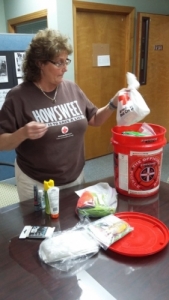Red Cross: Prepare now for hurricane season
By Becky Barclay
Published in News on June 3, 2018 3:05 AM

News-Argus/BECKY BARCLAY
Kathy Jones, Red Cross disaster program specialist for Wayne County, packs a disaster kit. She said everyone should prepare a kit before a hurricane strikes.
When hurricane-force winds are howling and water is pouring into your yard, that's not the time to think about preparing for a disaster.
Hurricane season officially started Friday, but Wayne County residents should have already started their disaster preparations before that.
"Everybody should prepare for hurricane season," said Kathy Jones, American American Red Cross disaster program specialist for Wayne County. "You should prepare year-round before hurricane season gets here. Get a kit, make a plan and be prepared."
Jones said everyone should have a disaster kit in their home.
"Just in case there's a disaster and you can't get back in your house, you will have to take that kit and leave," she said. "If you have to leave your home, it's something that you can easily grab and go. If you have your kit, you can shelter in place in your home if you can't leave."
Jones said a simple tub will do for your disaster kit supplies. And you can have a separate kit if you have pets.
"If you have a kit, at least you know you have those items," she said. "Maybe it's a severe tornado, but your home is still livable but you have no electricity and you can't get out to go to a shelter and at least you have your items already packed and you have food and things that are necessary."
She said if you have a kit year-round, make sure to switch out any food that may go bad. She said most canned foods have a long shelf life, but crackers and things like that will get stale.
One very important item to include in your disaster kit is a battery operated or hand-crank radio to keep up with what's going on weatherwise. These can be purchased from the Red Cross or at local stores.
"And being prepared includes watching the news," Jones said. "A watch means a storm is likely; a warning means it's here. You do definitely need to keep tuned to the news, the local news, because they're more familiar with the area and the geography. And the Weather Channel is also good."
Having an evacuation plan is also helpful -- before a disaster strikes.
"It could be a hurricane, huge chemical spill or something else with the base here," Jones said. "If you know a storm's coming, you may have friends or family in another area and you could plan on going there for a visit.
"During the hurricane season, pay attention to water levels in rivers, lakes and streams. If they're high and something's coming, that may be a concern. Start preplanning with an evacuation plan. A lot of times, the water comes in afterward as well. Everything may look OK today, but tomorrow it could be totally different."
And don't forget about your pet's safety.
Some Red Cross shelters allow pets, but in areas separate from where people are hunkering down.
"A lot of people don't want to leave their pets," Jones said. "If you do have to evacuate and just can't take your pet with you, let them go free, don't keep them chained up or tied up. They could drown if there's flooding. Even if they're inside, they may not be able to get out of the house in a disaster if the house fills completely with water. But animals have an instinct for surviving and they're very resilient."
Also, don't forget to gas up your vehicle if a hurricane is nearing. Jones suggested doing it when there's a watch and not wait until a warning has been issued. If you have a generator, don't forget to fill up your gas cans.
And remember to unplug things in your home if a hurricane is imminent.
"If there's flooding, things are going to short out," she said. "It could cause fires when the electricity comes back on."
Jones said the most common mistake the Red Cross sees when a hurricane strikes is people thinking it's not really going to happen.
"They're told to evacuate and they don't," she said. "They don't heed the warnings. A lot of times they don't have kits and are not prepared.
"In a hurricane, once the winds get to a certain strength, emergency management and the counties are not going to let their people out there in the danger. It's all about preparedness and heeding the warnings you are given."
If you have any questions about hurricane preparedness, you can call Jones at the Red Cross at 252-931-8658.
